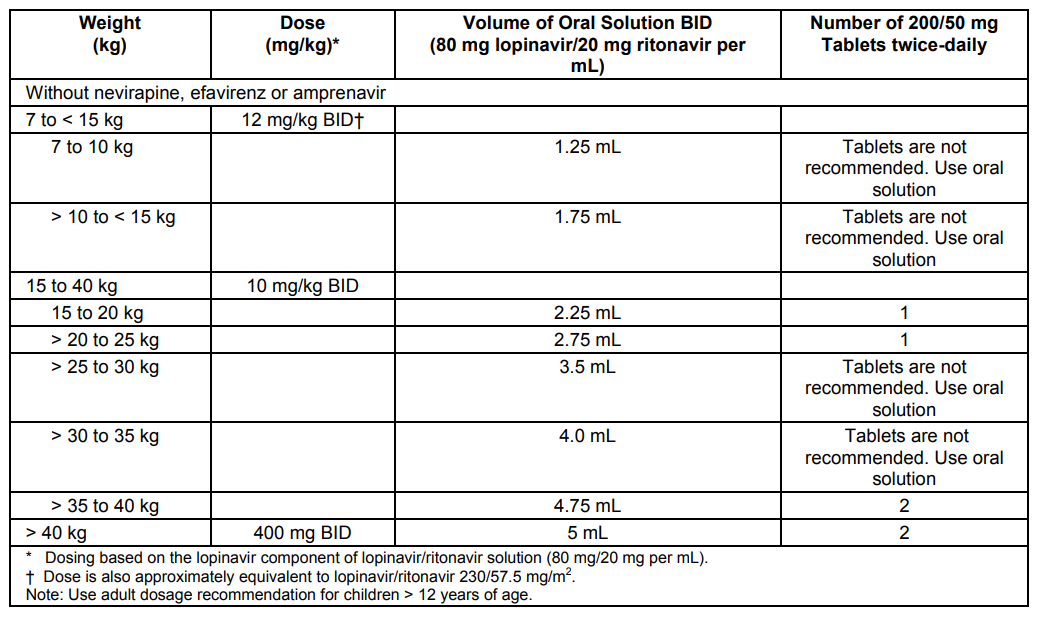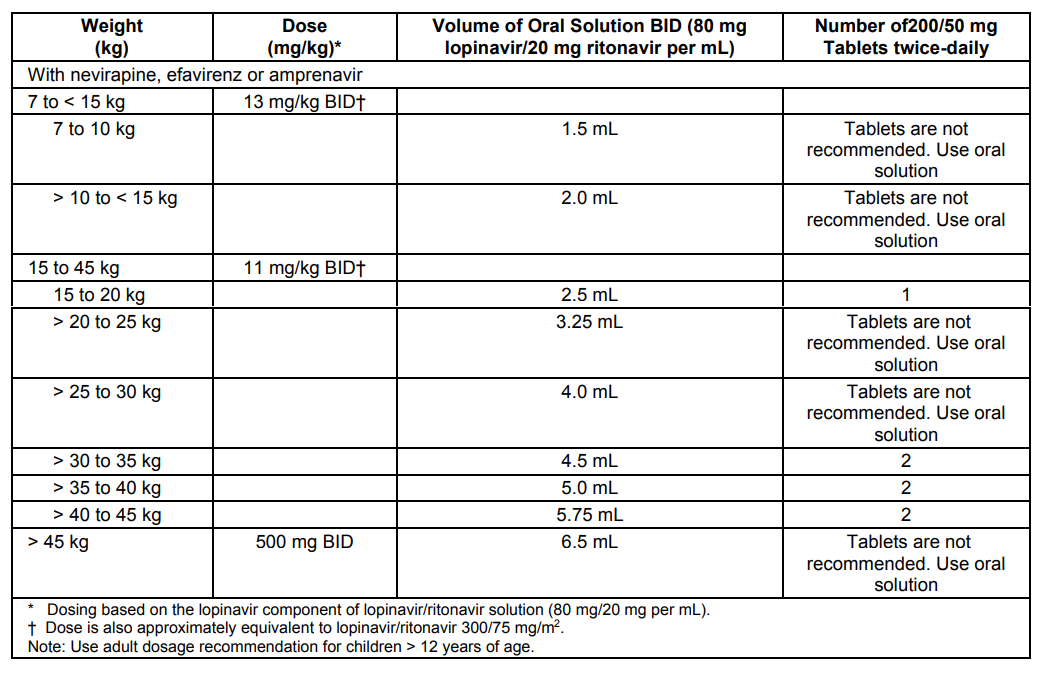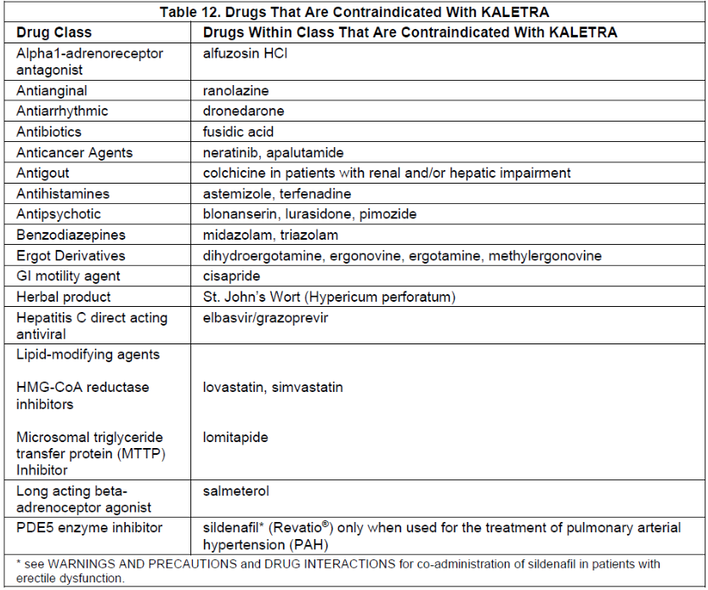Regulatory Information
HSA regulatory responsibility and product classification details
Regulatory Responsibility
Product Classification
Formulation Information
SYRUP
**DOSAGE AND ADMINISTRATION** **KALETRA tablets may be taken with or without food.** **KALETRA oral solution must be taken with food.** **KALETRA tablets should be swallowed whole and not chewed, broken, or crushed.** The recommended oral dose of KALETRA is as follows: (Please also refer to **INDICATIONS AND USAGE** and **ADVERSE REACTIONS** – _please refer to the Product Insert/Patient Information Leaflet published on HSA for the full drug information_) **Adults** The recommended oral dose of KALETRA is 400/100 mg (two 200/50 mg tablets or 5 ml oral solution) twice daily. KALETRA may also be administered as 800/200 mg (four 200/50 mg tablets or 10 ml oral solution) once daily in patients with less than three lopinavir-associated mutations. There are insufficient data to support the use of once daily administration of KALETRA for adult patients with three or more lopinavir-associated mutations (see **DESCRIPTION OF CLINICAL STUDIES** – _please refer to the Product Insert/Patient Information Leaflet published on HSA for the full drug information_). KALETRA should not be administered once daily in combination with carbamazepine, phenobarbital, or phenytoin (see **DRUG INTERACTIONS** – _please refer to the Product Insert/Patient Information Leaflet published on HSA for the full drug information_). **Concomitant Therapy** **Efavirenz, nevirapine, amprenavir or nelfinavir** - KALETRA 400/100 mg tablets can be used twice-daily in combination with these drugs with no dose adjustment in antiretroviral-naïve patients. - A dose increase of KALETRA oral solution to 533/133 mg (6.5 mL) twice-daily taken with food is recommended when used in combination with efavirenz, nevirapine, amprenavir or nelfinavir in treatment-experienced patients where decreased susceptibility to lopinavir is clinically suspected (by treatment history or laboratory evidence) (see **DRUG INTERACTIONS** – _please refer to the Product Insert/Patient Information Leaflet published on HSA for the full drug information_). KALETRA should not be administered as a once-daily regimen in combination with efavirenz, nevirapine, amprenavir or nelfinavir. **Dosing During Pregnancy and the Postpartum Period** **Tablets** - Administer 400/100 mg of KALETRA twice daily in pregnant patients with no documented lopinavir-associated resistance substitutions. Once daily KALTERA dosing is not recommended in pregnancy and postpartum. - There are insufficient data to recommend dosing in pregnant women with any documented lopinavir-associated resistance substitutions. - No dosage adjustment of KALTERA is required for patients during the postpartum period. **Pediatric Patients** KALETRA tablets and oral solution should not be administered once daily in pediatric patients < 18 years of age. The adult dose (400/100 mg BD) may be used in children > 12 years of age. Total amounts of alcohol and propylene glycol from all medicines, including KALETRA oral solution, that are to be given to infants should be taken into account in order to avoid potentially lethal toxicity from these excipients (see **DESCRIPTION, WARNINGS AND PRECAUTIONS**, AND **OVERDOSAGE** – _please refer to the Product Insert/Patient Information Leaflet published on HSA for the full drug information_). In children 6 months to 12 years of age, the recommended dosage of KALETRA oral solution is 12/3 mg/kg for those 7 to < 15 kg and 10/2.5 mg/kg for those 15 to 40 kg (approximately equivalent to 230/57.5 mg/m2) twice-daily taken with food, up to a maximum dose of 400/100 mg in children > 40 kg (5.0 mL or 2 tablets) twice-daily. **It is preferred that the prescriber calculate the appropriate milligram dose for each individual child ≤ 12 years old and determine the corresponding volume of solution or number of tablets.** However, as an alternative, the following table contains dosing guidelines for KALETRA oral solution or 200/50 mg tablet based on body weight. When possible, dose of the oral solution should be administered using a calibrated dosing syringe. Before prescribing KALETRA 200/50 mg tablets, children should be assessed for the ability to swallow intact tablets. If a child is unable to reliably swallow a KALETRA tablet, the KALETRA oral solution formulation should be prescribed.  **Concomitant Therapy: Efavirenz, nevirapine or amprenavir** A dose increase of KALETRA is needed when co-administered with efavirenz, nevirapine or amprenavir in children 6 months to 12 years of age in which reduced susceptibility to lopinavir is clinically suspected (by treatment history or laboratory evidence). For oral solution, a dose increase to 13/3.25 mg/kg for those 7 to < 15 kg and 11/2.75 mg/kg for those 15 to 45 kg (approximately equivalent to 300/75 mg/m2) twice-daily taken with food, up to a maximum dose of 533/133 mg in children > 45 kg twice-daily is recommended. The following table contains dosing guidelines for KALETRA oral solution and 200/50 mg tablet based on body weight, when used in combination with efavirenz, nevirapine or amprenavir in children (see **CLINICAL PHARMACOLOGY** – Drug-drug Interactions Table 5 and/or **DRUG INTERACTIONS** Table 13 – _please refer to the Product Insert/Patient Information Leaflet published on HSA for the full drug information_).  **Use of Oral Solution with a feeding tube** The prescribed dose of KALETRA oral solution can be administered via a feeding tube. Follow the instructions for the feeding tube to administer the medicine. Products containing alcohol, like KALETRA, are not recommended for use with polyurethane feeding tubes due to potential incompatibility.
ORAL
Medical Information
**INDICATIONS AND USAGE** KALETRA is indicated in combination with other antiretroviral agents for the treatment of HIV-infection. This indication is based on analyses of plasma HIV RNA levels and CD4 cell counts in controlled studies of KALETRA of 48 weeks duration and in smaller uncontrolled dose-ranging studies of KALETRA of 144–360 weeks duration.
**CONTRAINDICATIONS** KALETRA is contraindicated in patients with known hypersensitivity to lopinavir, ritonavir or any excipients. Co-administration of KALETRA is contraindicated with drugs that are highly dependent on CYP3A for clearance and for which elevated plasma concentrations are associated with serious and/or life-threatening events. These drugs are listed in Table 12. 
JA5AR10
xja 5 ar 10
Manufacturer Information
ABBVIE PTE. LTD.
AbbVie Inc.
